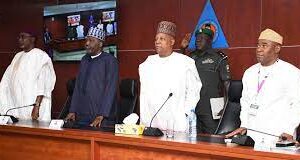Insists on restructuring
By Bode Olagoke
Abuja
Former Vice-President and chieftain of the governing All Progressives Congress (APC), has warned that federal government may soon collapse if nothing urgent is done, even as he attributed his reasons to the weight of “too many responsibilities it burdens itself with.”
Atiku, who has never hidden his call for the restructuring of the country’s political structure, yesterday restated his call for the restructuring of the nation, using the current financial insolvency of the nation to further his advocacy.
Turaki Adamawa took to his twitter handle (@atiku) to once again express disgust at the way governance is currently structured and the voice of opposition against it, being suppressed.
He expressed displeasure at the current economic challenges facing the nation, insisting that the issue could have been avoided if the country had been properly restructured.
The tweets reads: “Our Federal Government can no longer afford to meet many obligations. Does it still make sense to have a centrist FG?#Restructuring.
“The economic consequence of over-centralization is that FG may collapse under the weight of too many responsibilities it burdens itself with. If they do the same thing- reduce FG control on the economy, thereby making it more efficient, I don’t see a problem.
“So, not only is our FG too large, the economic downturn has exposed fundamental weaknesses. Yes, FG duties need to be reduced/devolved.”
When one of his followers asked what he did to decentralize the federal government as Vice President, Atku said he was only assigned to manage the economy, explaining that “a Vice President cannot lead a restructuring policy”
“I supported wide ranging deregulation, derivation for states, proposed NDDC. Remember, derivation % was supposed to grow; I was only a VP o. What I was assigned to do was economy, and we made bold changes, fixed national debt, bad assets etc, a Vice President cannot lead a restructuring policy. Not then, not today,” he said
The former VP had on December 12, in a speech titled “Strength and Unity in Renewal: Towards a Rebirth of Nigerian Federalism”, delivered at the Public Presentation of a book ‘The Nigerian Federalism: Continuing Quest for Stability and Nation-Building”, edited by Okechukwu Ibeanu and Mohammad J. Kuna, at NAF Conference Centre & Suites, Abuja , stated clearly that the ethnic nationalities in the country needed to come together and determine jointly how the nation must be run.
It would be also recalled that Atiku had declared earlier in the month that there is nothing sacrosanct about Nigeria’s unity just as he noted that there are inherent weaknesses in the present arrangement.
He believes that federalism, as being practised in Nigeria, is bastardised and not working because the power at the centre is too much, not getting used for the interest of the people but for the economic interest of those in position of authority alone.
His words: “What I find odd and somewhat unhelpful is the argument of those who say that we cannot renegotiate our union and who proceed from there to equate every demand for restructuring with attempts to break up the country. I believe that every form of human relationships is negotiable.
“Every political relationship is open for negotiations, without pre-set outcomes. As a democrat and businessman, I do not fear negotiations. That is what reasonable human beings do. This is even more important if a stubborn resistance against negotiations can lead to unsavoury outcomes.
“I have spoken a number of times in the past several years on the need to restructure our federation in order to devolve more power and resources to the federating units.
“Recently I went to Kaduna and told an audience of mostly my compatriots from the North, where most of the resistance against restructuring seems to come from, that restructuring is in the interest of the North and Nigeria.
“I have even called on states in each geo-political zone to, in the interim, pool their resources together to provide some services for their people for greater efficiency and cost effectiveness.
“The federating units in the First Republic had their disagreements but none claimed to lack autonomy of action, and none waited for federal fiscal allocations before it could implement its programmes and pay salaries. The current structure may be working for some elite but it has clearly not worked well for any section of this country and the country as a whole.
“We should take deliberate steps to change this structure to serve us better. And we should not dither for too long that we let fear and expediency stampede us into another disastrous policy shift that may not serve us well either.
“We have to acknowledge that federalisms are works in progress: there is no ideal federal system or so-called true federalism. Each nation has to work out the best federal system suited for it. In Nigeria’s case we must acknowledge that it is disingenuous if not outright dishonest to say that the system is not the problem.
“If the problem is just the operators how come we have failed for 50 years to produce the right people? Should we import them from outer space? A look at our 1999 constitution, specifically Section 7, which, as the Introduction to this book notes, has 83 legislative items as against 15 for the states (which the Federal Government can also override) shows that there is a huge problem with the system.
“I challenge anyone who is against restructuring our federation to show me another well-functioning federal system in the world with that level of lopsided central dominance. Individuals operate within certain structural and institutional constraints. If all we lack are good operators, as these people argue, would anyone advocate doing away with constitutions altogether so we rely on fantastic individuals to do the right things.
“We must acknowledge that agitations for more states across the country, the clamour for more federal take-over of state institutions, and the clamour for local government autonomy (i.e. autonomy from state governments) are inconsistent with establishing a viable and well-functioning federal system.
“We already have too many weak and unviable states. What we need are stronger federating units (be they existing states or zones) with a greater share of resources and responsibilities.
“I have been shouting myself hoarse asking why we should have federal roads, federal schools, federal hospitals, etc. I have called for state police, for the states that so desire, to help us provide more effective security.
“In 202 I went before ALGON in Enugu and told them that their clamour for local government autonomy from state governments is misguided. I told them that it is wrong for the federal government to be creating local governments and giving them money directly from the Federation Account. What is the meaning of “local” then, I asked?
“How does the transfer of local government dependence on state to central government translate to autonomy? Even our state governments are nearly totally dependent on the federal government, meaning they do not even have the autonomy that we are trying to give to the local governments that are below them. This is a complete absurdity.
“Can anyone honestly claim that our local governments have performed better since the introduction of the joint state/local government account than they did prior to the coming into effect of that constitutional provision? We must end our culture of institutional escapism in this country. By that I mean our tendency to create new institutions to solve problems for which we already have institutions just so we avoid dealing with the shortcomings of the existing institutions.
“We must acknowledge that in federal systems that work, federating units cede certain powers to the centre. In our strange federal contraption, it is the centre that is creating federating units, giving them money and monopolizing most power and resources. Thus our state governments are no longer performing as federating units. Rather they currently seem like dependent provinces of the central government in Abuja.”



